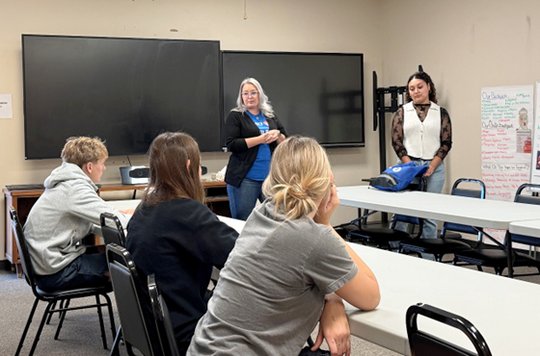UPDATE: Youth in Great Bend are transforming their financial futures as they gain essential skills in a newly launched Life Skills class. Participants, who initially reported lacking financial goals, are now equipped with actionable plans following guidance from local banking experts.
During the recent session, attendees learned critical strategies for managing their finances, including the vital 50/30/20 rule. This budgeting framework encourages individuals to allocate 50 percent of their income to necessities, 30 percent to discretionary spending, and 20 percent toward savings or debt repayment. “They mentioned starting a savings account and setting long-term goals for buying a car or house someday,” stated Laura Mason, community case manager at Juvenile Services (JS).
This innovative finance class is one of many offered by JS throughout the year, aimed at empowering youth in the 20th Judicial District, which includes Barton, Rice, Ellsworth, Stafford, and Russell counties. “We want to provide our JS clients with tools to build confidence, become more independent, and navigate the challenges of adulthood,” Mason emphasized.
Participants were also addressed by Jennifer Harman, bank manager and assistant vice president at BMO Bank in Great Bend. She underscored the importance of financial literacy for young people. “It’s incredibly important for young people to develop financial literacy early on,” Harman remarked. “This helps them build strong habits that put them on the path to success and make informed decisions today and later in life.”
Topics covered in the class included comparing types of bank accounts, maintaining a budget, distinguishing between wants and needs, and setting achievable financial goals. Harman highlighted BMO Bank’s commitment to fostering financial literacy, stating, “We offer this program as part of our commitment to build stronger, more inclusive communities and help people achieve long-term financial success.”
The impact of this initiative goes beyond just numbers; it aims to empower youth and underserved communities, promote financial confidence and resilience, and advance economic inclusion. Participants left the class with newfound motivation and clear steps toward their financial futures.
What’s Next? Parents and guardians are also encouraged to engage with JS programs, such as The Parent Project, to further support their children’s development. For those interested in joining future classes or seeking financial guidance, visit 1800 12th in Great Bend or call 620-793-1930.
This urgent initiative represents a significant step toward equipping the next generation with the financial skills they need to thrive. As these young people embark on their journeys, their progress will be closely watched by the community, which is eager to see them succeed as productive members of society.
